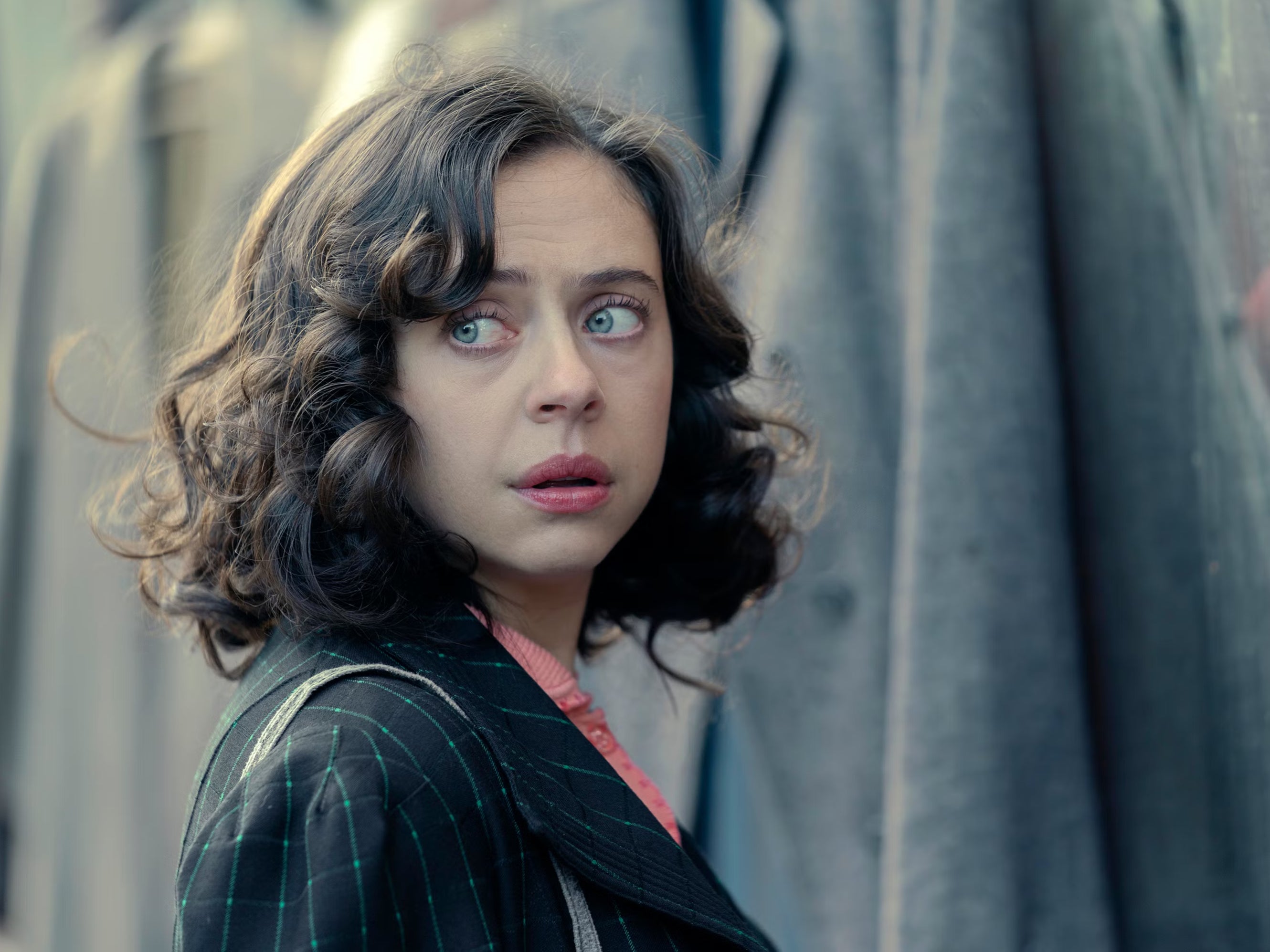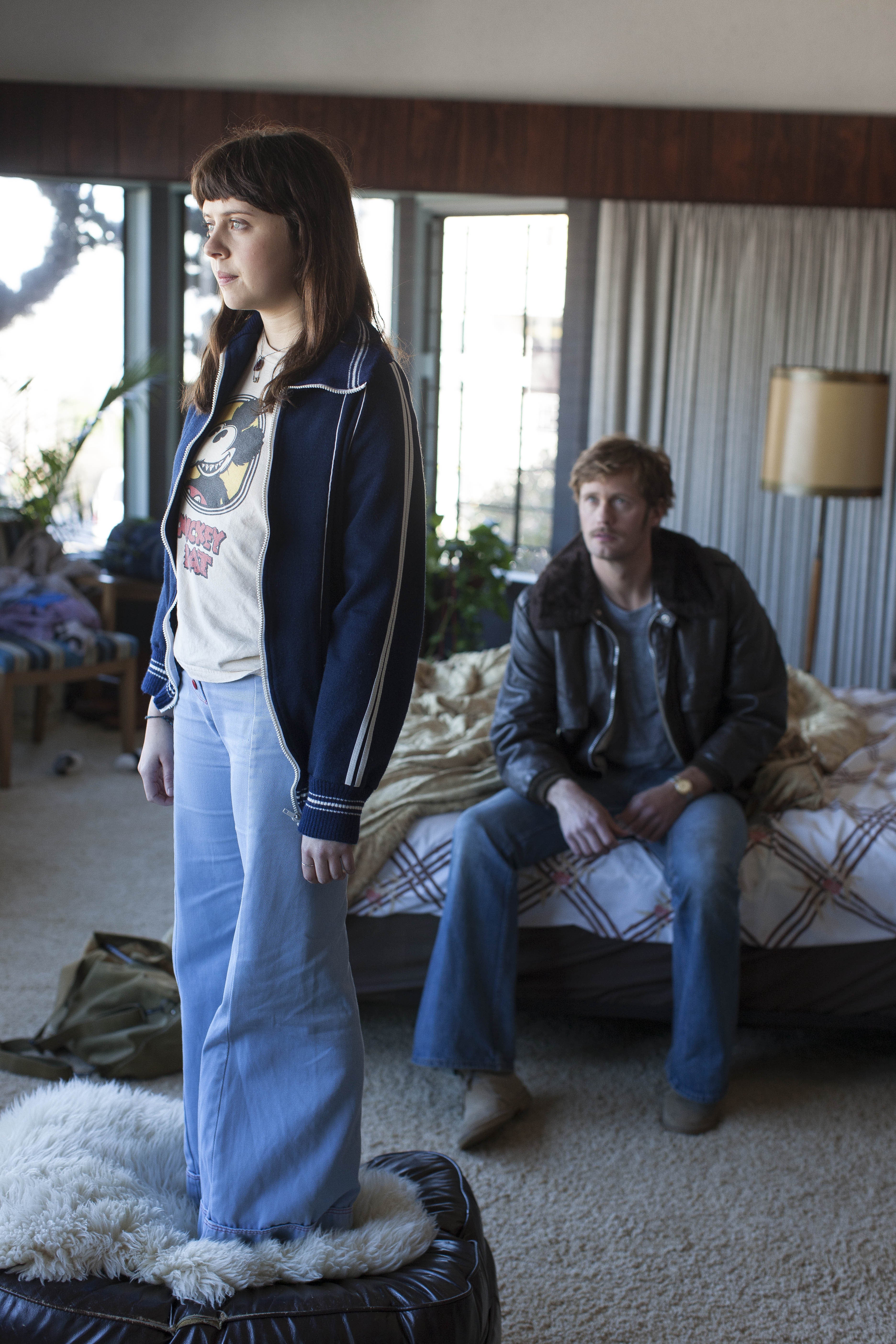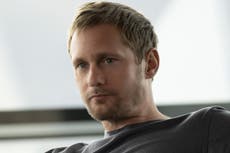Bel Powley on Botox, nepotism and difficult sex scenes: ‘The heroin chic thing is gonna die again, right?’
The star of ‘The Diary of a Teenage Girl’ and ‘Everything I Know About Love’ talks to Ellie Harrison about playing the woman who hid Anne Frank and rescued her diary in ‘A Small Light’


What’s all this f***ed-up s*** about how heroin chic is back?” Bel Powley is sprawled out, barefoot, on a chaise longue. And she’s mad. “Like, what the hell even is that? Sorry, that’s a complete sidenote, but hopefully that’s gonna die a death again, right?”
It’s not a total sidenote. We’ve been discussing how, in the Noughties – when the 31-year-old star of The Morning Show and Everything I Know About Love was a teenager – it was rare to see a “normal” body on film. Thigh gaps, perky bums and washboard stomachs always seemed to nab top billing. One of Powley’s first films, though – the subversive, sometimes uncomfortably honest coming-of-age story The Diary of a Teenage Girl – put ordinary bodies front and centre. Then poked and prodded at them, too. One scene in the 2015 movie saw Powley’s hormone-packed teen stand naked before the mirror and inspect the way she was changing.
“The reason why that moment sticks out is because there aren’t many moments like that,” Powley says, hugging a pillow in a London hotel room. “Still now, if a woman is naked in a film, it’s during a sex scene. It might be different for Gen Z, because there’s more representation out there for all different kinds of women and bodies, but when I was growing up, that definitely didn’t exist.” She fiddles with the cushion. “I don’t know if I’d be brave enough to do that scene now. As you get older, you get more scared. I was only 20 or 21 when I filmed it.”
Powley has a tendency to speak in sharp bursts, squeals and whispers, as if you’re on a girlie sleepover. In fact, she’s so happily chatting away – about everything from her favourite shows to the world’s fixation on the female form – that it’s easy to get distracted from the topic of the day, her charming Second World War drama A Small Light, which is streaming now on Disney+.
Before we get to that, Powley tells me she’s been devouring the second season of cannibal drama Yellowjackets. She’s specifically in awe of its star Melanie Lynskey, who recently defended herself on Twitter against claims that she had the wrong body type to play a ruthless resistance leader in the video game adaptation The Last of Us. Powley’s response to that? “Oh, f*** off!” she splutters, leaning forward. “People are also obsessed with women’s faces,” she adds. As a woman in her thirties, Powley is aware that some of her peers are starting to get Botox, or at least feeling the pressure to tweak themselves. “I personally haven’t had anything done to my face and I don’t think I will, but you shouldn’t judge anyone, or even comment on anyone, for doing it or not doing it. And there are so many weird websites where they’re like, ‘What has she done?’ or, ‘What should she do?’ It’s so dumb.”
Powley also has lots to say about being a woman in the film industry. The Diary of a Teenage Girl saw her play a sexually curious 15-year-old who starts sleeping with her mum’s boyfriend (Alexander Skarsgård), and she says the film’s director, Marielle Heller, was incredibly protective of her on set. Much of the film’s creative team was female, as well. But her sex scenes on other indies weren’t as smooth. “I did have a couple of bad ones, where everyone’s too awkward to ask if you’re gonna take your clothes off, and you don’t have it written up properly in the contract,” she says. “It’s low-budget, indie, guerilla-style filming. You’re outside, and suddenly it’s the scene where you have to get naked and simulate sex, and then you just find yourself doing it because you’re too scared to say no, with a young actor who probably felt just as uncomfortable.”
She then begins to talk, unprompted, about an off-camera incident, too. “I’ve had someone grab my arse and basically touch me inappropriately before,” she says, “but I was too scared to say anything. I was too scared to rock the boat.” The incident, which involved a senior member of the crew, happened when Powley was in her early twenties. “Ughh,” she says, a shudder running through her. “I just avoided that person and it was fine, but what really has changed post-MeToo is you just know that you’re protected. At the beginning of MeToo it was weird. For a while it was like, I feel protected because men are just f***ing scared – which was fine too – but now everything’s settled into itself. People have learnt, and it’s like there’s a new code of conduct.”

Powley’s earliest roles came in cosy British television – she starred in the CBBC spy series MI High and the sun-drenched ITV sitcom Benidorm – but after The Diary of a Teenage Girl, she blossomed. Powley excels in parts that bring out her specific brand of irrepressible breathlessness – as a flibbertigibbet Princess Margaret in A Royal Night Out, or a headstrong TV staffer in The Morning Show, or the fizzy, sensible lead in the TV adaptation of Dolly Alderton’s Everything I Know About Love. Judd Apatow, who directed her in 2020’s The King of Staten Island – where she played the frustrated on-and-off girlfriend to Pete Davidson’s overgrown slacker – has praised her to the hilt. “It’s clear that when you have a Daniel Day-Lewis or Dame Judi Dench on your set, they don’t know what’s about to happen to them,” he said a few years ago. “She’s very young, but in my head, she’s going to be one of the all-time greats.”
While Powley says she hardly ever gets starstruck, working with Jennifer Aniston on The Morning Show turned her back into the fawning Friends fan she was as a teen. Though she was terrified of calling her hero “Rachel” by mistake, she was deemed cool enough to be invited to a party at the actor’s house. Powley is cool – she’s got a posh, husky voice and looks at home in a black leather jacket when we meet. She doesn’t seem to see herself that way, though. She sees more of herself in Birdy from Everything I Know About Love. “I’m a tidy freak,” she says, “and I like to plan. I’m not very good at being spontaneous, and it makes me quite anxious if I don’t know what’s gonna happen.” So she’s never been thrown a surprise party? “No, because everyone in my life knows it would be my worst nightmare.” She lets out a big, delicious guffaw. “No one should ever do that to me. I’m the kind of person where even with gifts, I tell people what I want. Basically, I’m hell.” Her fiancé – the actor Douglas Booth, whom she met on the 2017 costume drama Mary Shelley – is the opposite. “I feel like we’re good yin-and-yang. We definitely learn from each other. I’ve probably relaxed a bit and he’s probably learnt to be more organised.”

Watch Apple TV+ free for 7 day
New subscribers only. £9.99/mo. after free trial. Plan auto-renews until cancelled.
ADVERTISEMENT. If you sign up to this service we will earn commission. This revenue helps to fund journalism across The Independent.

Watch Apple TV+ free for 7 day
New subscribers only. £9.99/mo. after free trial. Plan auto-renews until cancelled.
ADVERTISEMENT. If you sign up to this service we will earn commission. This revenue helps to fund journalism across The Independent.

Powley has been told she’s got a “period drama face” – she is rosy-cheeked and slightly cherubic – but says she’s mostly shied away from those sorts of roles: “When I have done it, I’ve often felt this kind of distance. It’s hard to connect.” But A Small Light felt different. She plays Miep Gies, the Dutch woman who hid Anne Frank and her family from Nazis and ultimately saved the young girl’s diary. Despite her having played an instrumental role in Second World War history, Miep’s name is known to few. A Small Light aims to rectify that, and Powley brings her innate mischief to the role. Her Miep is a twentysomething secretary who loves dancing; someone you could gossip down the pub with for hours. When collecting rations for the Franks, she flirts her way to a bigger chicken from the butcher. The real Miep was an ordinary person doing an extraordinary thing, and her motto – that anyone can “turn on a small light in a dark room” – gives the series its name.

The show also has a modern sensibility, with dialogue that feels natural – “no Downton Abbey speak”, as Powley puts it – and wardrobes that make Miep and her friends look almost like hipsters. For research, Powley read Miep’s autobiography “cover to cover a few times” and visited Amsterdam, going to Miep’s old home and cycling her route to work. The series was filmed in Prague, which stood in for the Dutch capital, and some Ukrainian refugees fleeing to the city at the time of production ended up working on the set. “The Czechs are very outspoken about their support for Ukraine,” recalls Powley. “On every building in Prague, there’s a Ukrainian flag. And there are so many parallels between the show and what’s happening right now – from the war in Ukraine, and authoritarian regimes popping up all over the world, to the rise of antisemitism and the refugee crisis...”
I’m a nepo baby... I’m guessing that’s bad
A Small Light has been an emotional project for Powley, who is Jewish herself. Her great-grandparents lived on the border of Russia and Lithuania, and they fled during the pogroms of the early 20th century. She recounts how they got on a boat to New York and, thinking they’d already arrived in America, accidentally got off at the fuelling stop in Dublin. “I’m not joking,” she says, that big guffaw returning. “I think a few families did it. That definitely needs to be made into its own TV show.” Although her grandmother was safe in Dublin during the war, Powley says “you still do, as a Jew, grow up with the weight of that part of history on your shoulders”. She tells me that, the night before our interview, the Jewish side of her family came to the London premiere of the show. “They were all very, very moved by it. All weeping by the end. My grandma, who was the classic, chicken-soup-making Jewish matriarch in my family, died in 2020 and we were all so close to her, and I know that it would have meant so much to her that I was in this show, and she would have been very proud.”
Powley grew up in west London; her mother is a casting director, her father an actor. I tell her I want to talk about nepo babies. She erupts. “Oh my God, I’m a nepo baby!” She admits she’s not that tapped in to the recent discourse around nepotism in the entertainment industry. “All I know is that technically I am one,” she cackles. “And I’m guessing that’s bad!” She’s quiet for a moment, thinking, before another eruption. “Why do people care about this?!” I say that my dad was a journalist, so perhaps I’m technically a nepo baby, but that it’s seen as unfair when celebrities’ parents are megastars who give their untalented children shortcuts. “Yeah, I get that that’s bad,” she says. “But if they are talented and they’re doing good work, like, why does it matter? I did a Judd Apatow movie, and he’s got a couple of nepo babies. But [his daughter, the Euphoria star] Maude is f***ing great, so why does it matter?”
Powley doesn’t believe she’s had a leg-up from her parents. “The only thing I’ll admit,” she says, laughing, “is that my mum was a casting director on The Bill and she did cast me in one episode. And if people are annoyed about that, then they can go and get a life, because every actor in England is in an episode of The Bill. It’s a rite of passage, whether your mum’s the casting director or not.” Even her dad starred in the police procedural – did her mum cast him in it? “No, my dad worked on The Bill before my mum – she’s a nepo wife!”
‘A Small Light’ is streaming on Disney+
Join our commenting forum
Join thought-provoking conversations, follow other Independent readers and see their replies
Comments


Bookmark popover
Removed from bookmarks